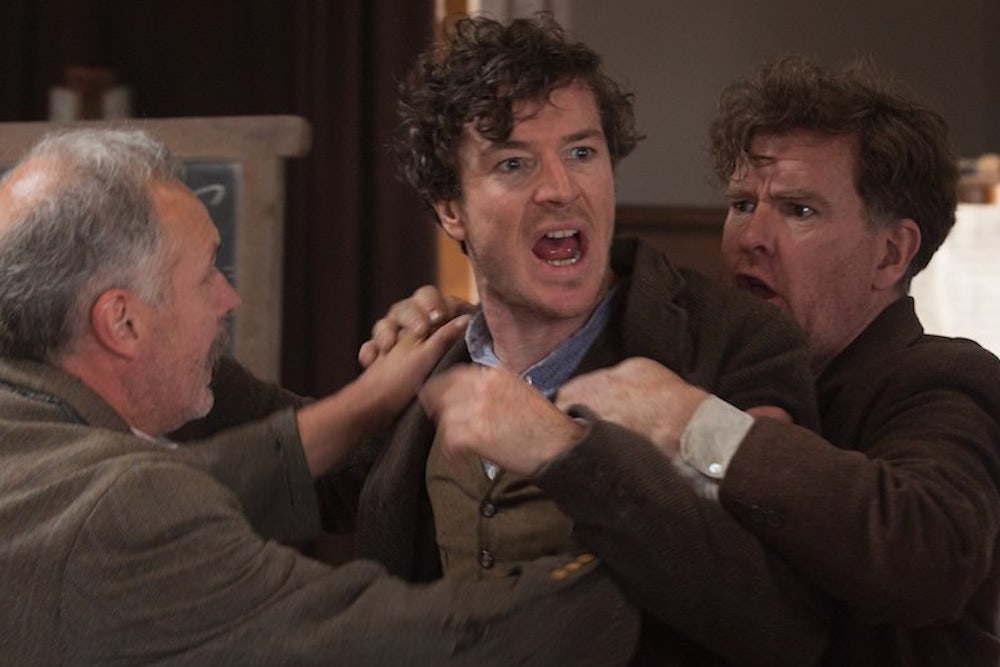Jimmy Gralton is not a household name, but as the only Irishman ever deported from Ireland, he’s certainly an intriguing candidate to receive movie treatment. An early Irish communist, Jimmy’s life and times are the subject of Jimmy’s Hall, the latest—and perhaps the last—film by celebrated British director Ken Loach. At 79, Loach has reportedly lost sight in his left eye, and doctors warn his right one could follow at any time.
Loach, an avowed socialist, is known for the political tinge of his films. His renowned early film, Kes (1970), told the story of a working-class boy who defies England’s class-based education system by training a hawk; his 2013 documentary The Spirit of ’45 chronicled the year Britons embraced socialism; and his 2006 war drama, The Wind That Shakes the Barley—which took home the top prize at Cannes—framed the fight for Irish independence in terms of class struggle. Heavily influenced by the Italian neo-realists, Loach frequently casts non-professional actors, only uses natural light, and encourages his actors to mumble to produce a naturalistic feel.
With all that in mind, Jimmy’s Hall, which opens this week in America after competing at Cannes last year, slides perfectly into Loach’s oeuvre as the latest installment of the working man’s struggle against oppression. In the midst of the Great Depression, Jimmy Gralton (played by a little known stage actor named Barry Ward) returns to his hometown in a remote corner of Ireland after a decade of exile in New York to lead a quiet life with his aging mother. His friends take bets on how long that will last, and sure enough, within days Jimmy sets about reopening the dance hall-cum-community center that got him in trouble with the authorities the first time around. The local Catholic priest brands him and his followers antichrists for encouraging young people to mingle; the landlords find his socialist message and popularity among the working class dangerous. The clash—and its ensuing result—feel inevitable.
In its best moments, Jimmy’s Hall is a compelling small-town drama, populated with empathetic, refreshingly average characters, who look and feel as comfortable amid the scenery as the stone cottages dotting the countryside. Loach displays his knack for capturing the beauty in the banality of everyday life—in the lines of an old woman’s face, coals burning on a hearth, the laughter of young people dancing. When a group of women learn an Irish folksong, they sound ordinary, a few singers off-key here, a couple of stragglers holding notes for too long there.
Loach’s grounded approach also serves the love story at the periphery of the film. Jimmy comes back to Ireland bearing gifts for the sweetheart he left behind, Oonagh (Simone Kirby). Though Oonagh has since married and had two children, her enduring connection to Jimmy is immediately clear. In one of the most beautiful scenes in the film, Jimmy and Oonagh dance in the empty, moon-lit hall to music only they can hear. It’s a moment that distills the villagers’ fight to its heartbreaking core: They’re not fighting for ideology or for faith; they’re fighting to live their lives as they choose.
By celebrating the struggle of ordinary people against authority, Loach makes his political message clear. But ultimately, the specific political-historical context subsumes the more universal struggles involving individuality and authority. Most viewers will not be well-versed enough to follow (at least outside of Ireland) the ins and out of the history Loach invokes: The moment the movie opens with several captions explaining the complicated history of civil war, the Church, and changing governments, we know we’re in trouble. Hurried references to the IRA, the Eucharistic Congress of 1932, and Stalin’s famine in Ukraine give the movie the feeling of a political thriller, where fast-talking agents throw around references and jargon intended to set the mood rather than convey crucial plot details. But that style is out of place here. By trying to give Jimmy’s Hall the gravitas of a national struggle, Loach obscures his story. Elegant but uneven, Jimmy’s Hall becomes one history lesson too much.
